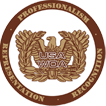The Bob Scott USAWOA Legacy
The article below was written by CW4(R) Don Hess (deceased) and appeared in the April 2015 USAWOA Newsliner.
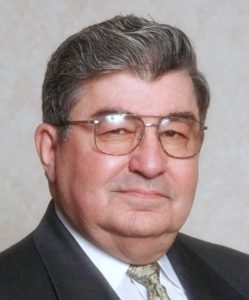
By: CW4 (Ret) Don Hess
Founder and President Emeritus, USAWOA
On a misty morning on 27 March 2015 family members, fellow Warrant Officers, Pentagon Federal Credit Union employees and other friends of CW4 (Ret) Robert (Bob) D. Scott met in a beautiful church setting in Reston, VA, to honor and celebrate the life of an outstanding patriarch, soldier, and civil servant whose life epitomized service to others. It is difficult to put into words the impact this quiet, reserved individual had on our Association, not only in the critical stages of our formation and growth more than 40 years ago, but in his continued perseverance and dedication until the very day he passed away. Fortunately, his experience and knowledge of our Association was willingly shared with others over the past four decades.
I wanted to share some of my personal experiences with this truly remarkable, dedicated soldier and friend of almost half a century. His amazing vigor and persistence as a volunteer – who truly loved the Warrant Officer community – were evident to all who knew him. Many of our Members knew Bob well – especially those who worked with him in the Washington, DC, area or who served on our board of directors through the years. Other Members may remember him from his articles in the NEWSLINER. Let me try to describe the Bob Scott that I knew and loved.
Bob was stationed in Arizona when he attended our first Annual Meeting in Alexandria, VA. He volunteered to be our Director of Administration, to draft our bylaws and other administrative policies, to give us some structure. When Bob retired from the Army and came to Washington DC, to work in the civil service, his family remained in Arizona for approximately six weeks. Bob lived in my home during that time, and we spent many evening hours bouncing ideas off of each other. Bob was not a backslapper – he was reserved, detail oriented, and very serious about all aspects of his life. Neither of us had previously been involved in military associations until this point, so we had a lot to learn.
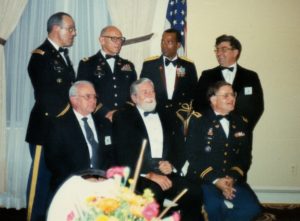
We were opposite personalities, but what brought us together was a common goal. We believed passionately that Warrant Officers of the 1970s were “stepchildren” to the officer corps, and were neglected – not by design, but by our limited numbers, scattered among the various career branches (The Warrant Officer Division had not yet been formed). We were convinced that Warrant Officers were capable of greater value to the Army, and to themselves, if given the proper training. Bob’s dedication to the Association was so strong that he bought a home for his family in Reston, VA, two miles from my home, so we could continue our joint efforts.
At that time we were also looking to rent an office, but could not find a suitable location within our budget. So we solved the problem by paneling the unfinished part of my basement, which served as our office for several years. Bob was also our construction foreman, and with the help of other Warrant Officers in the local area we built our USAWOA office on a weekend. We hired two neighborhood ladies to work part time during the school hours to process our memberships, and Bob often brought his daughter Kathy over during the summer months to stuff envelopes or crank out our early newsletters on an old mimeograph machine.
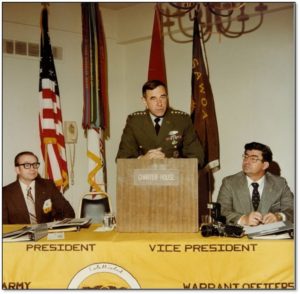
Bob was also a Signal Corps computer technician, so his military experience enabled us to develop our first computer program system. Working long hours at night, Bob’s experience – with the help of a small local computer company – enabled us to set up our first automated membership program.
He was the primary author of our bylaws, incorporation documents, administrative manuals and publications, and over four decades he spent countless hours monitoring and updating them as necessary. Bob served as the Association’s subject matter expert, familiarizing himself with Virginia corporate law, and writing, publishing and repeatedly updating thousands of pages of USAWOA forms, governing documents and other publications.
Bob also took classes at his own expense to become a certified parliamentarian, and became the Association’s Parliamentarian. He rarely missed a monthly Executive Committee (EXCOM) meeting, even when not a voting member. He was often given the proxy for an EXCOM officer who could not attend. Whether or not he held a proxy, he was always an active participant. He took copious notes, and then asked probing questions, such as “how much will it cost? Who will do the research? Is it in the budget?” Bob was also very blunt, which often caused some tense moments with those who presented proposals without having the background information available before a vote could be taken. Sometimes his tenacity and focus on an issue could be misunderstood. It was felt by some that Bob’s presence as a non- voting member “influenced” others on the board. But as the consummate pragmatist, Bob’s influence was always issue-oriented and focused, and not based on the personality or personal opinions of others.
Bob served as USAWOA National President from 1980 until 1982, during the growing period of our Association. He was instrumental in our Association’s goal of changing the Warrant Officer culture from technical officers to officer technicians, emphasizing the need for continued schooling and training as officers. He also served as interim Executive Director in 2004, during the search for a permanent Executive Director. His work ethic and dedication resulted in his mentoring national officers since our inception. A prime example is his decades of service on the finance committee, where his experience was crucial to the formulation and execution of USAWOA annual budgets. In all of his mentoring roles, he has been recognized as the supreme voice of reasoned experience and wisdom.
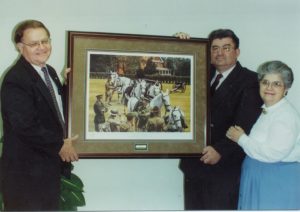
Because of his interest in education, Bob organized the Association’s scholarship activities. As the program grew he founded the USAWOA Scholarship Foundation (USAWOASF), established as a separate non-profit entity, and served as its Chairman. He personally managed the investment of foundation funds, selection criteria, and selection boards. He also managed the distribution of awards to scholars, wrote USAWOASF update articles, and marketed the program. During Bob’s final illness, he personally trained a new chairman from the current USAWOASF board of directors, to ensure a smooth transition.
I would be remiss if I didn’t include the relationship that Bob developed with the Pentagon Federal Credit Union (PenFed), and the benefits USAWOA enjoyed from that relationship. Bob initially expressed a desire to serve on the board of directors of PenFed, after discovering that a Warrant Officer had never served on that body. He applied for that position and was informed that the board would not hold an election, because the current members were all running for another term. He also learned that individuals could be nominated by petition. USAWOA published a petition notice in the NEWSLINER, stating that fellow Warrant Officer Bob Scott was qualified and requested petitions be signed and submitted, along with his resume, for the board of director’s position.
Bob was appointed to the 13 member PenFed Board of Directors, serving for 40 years in responsible positions and culminating as Vice Chairman of the Board and Chairman of the PenFed Foundation, which serves our wounded warriors. This action, 40 years ago, opened the door for the USAWOA affinity partnership program with PenFed. It was the first affinity partnership in PenFed history, and became the model for future PenFed affinity programs with other organizations such as the Military Officers Association of America (MOAA) and other organizations.
Bob further expanded this corporate partnership, resulting in PenFed hosting the USAWOA’s first web presence, at no cost to the Association. PenFed also sponsored displays at our annual meeting, purchased advertising in our NEWSLINER, and supported numerous other programs during the early years of the Association. Due in large part to Bob’s continued involvement, the relationship expanded over decades, building a rock-solid (and mutually beneficial) bond between the two organizations.
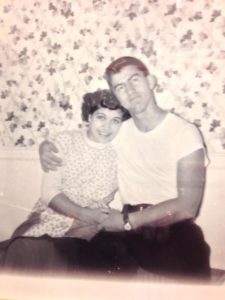
Two recent examples of this occurred in June 2013 and February 2015. In 2013, USAWOA and PenFed expanded their existing partnership, generating much-needed additional financial resources to USAWOA. As a gesture of good will (and sincere support of a worthy cause), USAWOA pledged $25,000 to support the PenFed Foundation’s Defenders Lodge in Palo Alto, CA. In February 2015, PenFed generously donated $25,000 to the USAWOASF. Today, scores of USAWOA Members enjoy a variety of valuable services from PenFed, including low interest rate, co-branded USAWOA/PenFed Visa Defenders Cards – these alone generate more than $4,000 per year in much-needed additional revenue to the Association, through rebates from PenFed. None of these great benefits would exist without the blood, sweat and tears of Bob Scott.
I close this article with memories of a man whose life was dedicated to others. My friendship with Bob and his family was built on a bond of mutual respect, admiration, and the obvious love of his family. Entering adulthood as a high-school dropout, Bob went on to receive his Bachelor’s and Master’s degrees, and was a graduate of the Federal Executive Institute. He was a senior executive fellow at Harvard University, in 1993. On the civilian side, he was a graduate of the Credit Union Director’s Leadership Educator (LE) program, and the Australian Development Educator (DE) Program.
Bob served as an infantryman in Korea, a distinguished Warrant Officer, a dedicated civil servant (at the highest levels), and volunteered his services on the board of directors of PenFed, the second largest credit union in the U.S. As a leader in the USAWOA he was awarded the Association’s Honorable Order of the Eagle Rising (gold level) and was designated as President Emeritus. He was also inducted into the Eagle Rising Society by the Warrant Officer Career College, and was inducted into the Defense Credit Union Hall of Fame. No matter the capacity, he was always highly regarded as a dedicated member of any entity he served on – and his opinion was always sought at the highest levels of leadership. I have been privileged to benefit from his mentorship and professionalism. I know of no other person who has brought so much talent, integrity, tenacity, and dedication to any task he assumes. He has left a prolific legacy for all, and will be sorely missed.
